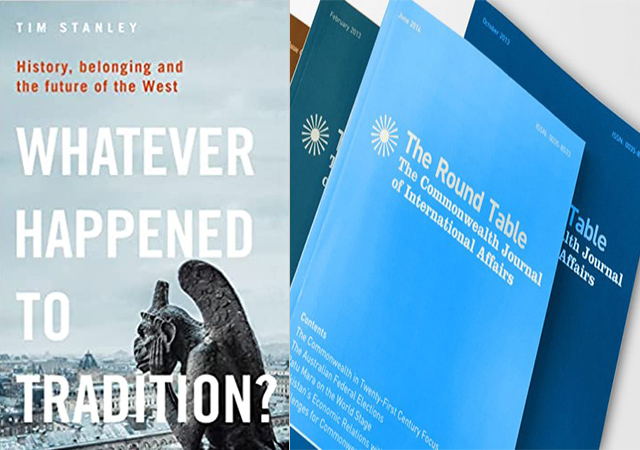
[This is an excerpt from an article in The Round Table: The Commonwealth Journal of International Affairs.]
It requires courage of a high order in the present day to mount a spirited defence of tradition. That is what this book does, and it does it with fluency, conviction, sagacity, passion, and wit. Counterintuitively, as some might think, it throws a challenge as much to conservatives as to radicals. ‘[I]f I achieve one thing’, asserts the author in his introduction to the work,
I hope it is to encourage conservative readers to widen their horizons, to look beyond the Enlightenment, beyond Britain and America, which are far too wedded to the Enlightenment, and even to read beyond conservativism itself, to take a second look at Marx and post-modernism, which contain critiques of modernity that are accurate and useful. (p. 6)
The Round Table: The Commonwealth Journal of International Affairs
India at 75: The Round Table, Volume 111, Issue 3 (2022)
Special edition introduction: Falkland Islands – 40 years on
COP26 special edition
The main burden of Stanley’s song is that the West’s abandonment of tradition has led, directly and inexorably, to misery and rootlessness. He identifies liberalism as the ‘primary villain’ (p. 5) in this sad story, and offers irrefutable evidence of the havoc that liberal policies, often emanating from benevolent impulses, have wrought on Western societies. But he is no doom merchant because he believes, despite all the dark portents, that ‘[t]raditions, like temples, can be rebuilt, stronger, more beautiful than before’. (p. 9)
Why is liberalism so corrosive in its effects despite being so seductive as a concept? Primarily because, contends Stanley, it emboldens irresponsible behaviour while promoting freedom:
Human beings can only exercise liberty if they are disciplined and self-giving: liberalism encourages us to put our own appetites first. The more freedom liberalism promises, the bigger the state has to grow to meet those expectations, and the more the state has to do to clean up the consequences of our actions. You’d imagine that a society committed to liberty would have a tiny bureaucracy, yet the 21st-century liberal state employs an army of public servants to tax us, teach us, heal us, protect us and keep an eye on what we’re thinking and saying. During the coronavirus pandemic, it felt at times as if the government had attempted to outlaw death. (p. 34)
Tradition, by contrast, acts as a brake on such excesses by, among other things, connecting ‘the individual to their society, passing on social knowledge, and transcending time and place’ (p. 40). Stanley shines a powerful light on the value of tradition for personal identity and notes that this has been the case not only in the Western world but even more so elsewhere, citing the importance given to tradition by, say, the Japanese, the Chinese, and the Aboriginals in Australia. There are particularly instructive passages in the book which explain the interplay between tradition and modernism in Japan, including about how adroitly Japanese leaders have adapted Western features to a rapidly changing Japanese society, with results that frequently draw admiration and envy from the rest of the world.
‘Transfer of Destinies’, or Business as Usual? Republican Invented Tradition and the Problem of ‘Independence’at the End of the French Empire
Commonwealth Bookshelf – current issue
There are many inconvenient truths to which Stanley draws our attention. These include the Western propensity to want to belong to traditions without participating in them (p. 122), the alacrity with which people are ranked by their level of victimhood (p. 136), the lazy tendency to rebrand segregation in society as ‘safe spaces’ (p. 136), the inflexible opposition to any form of moral judgement which makes it impossible to condemn or police ideas that seek to destroy society (p. 41), and the hypocritical behaviour of those who occupy positions of influence or leadership: ‘We have’, says Stanley poignantly, ‘clergy who avoid the subject of religion, teachers who think they can learn from the kids, doctors who ask “who do you think is wrong?” and police who want to be hip’. (p. 170) He offers the following telling example:
In 2017, budget cuts forced Avon and Somerset Police to cut their special burglary unit, which had only solved one in ten cases – yet its officers, male and female, found time to publicize the fight against modern-day slavery by painting their nails and posting photos of their handiwork online. Taxpayers were indignant; one civilian asked, ‘How about nailing some criminals?’ Avon and Somerset Police responded with a threat: ‘If anyone found these comments offensive, please report them to Twitter. If you feel you were targeted and are the victim of a hate crime, please report to us. We take this issue extremely seriously’. (p. 170)
Stanley is no blind supporter of conservatives either – they come in for sharp rebukes from time to time, notably for ‘routinely overlooking the responsibility of their own wealth and ambition’ (p. 188): for example, by allowing, through the encouragement of unbridled free markets, the elimination of old industries and their traditions. A forceful point which finds frequent expression in the book is that unless a proper balance is struck between rights and responsibilities, freedom and order, liberty and self-discipline, societies are doomed to failure.
Whatever Happened to Tradition? History, Belonging and the Future of the West by Tim Stanley, London, Bloomsbury Continuum, 2021.
Venkat Iyer is the editor of The Round Table: The Commonwealth Journal of International Affairs.



